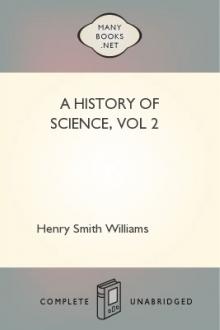A History of Science, vol 2 by Henry Smith Williams (most recommended books .txt) 📕

Nor can we doubt that men lived in every generation of the dark age who were capable of creative thought in the field of science, bad they chosen similarly to "intend" their minds in the right direction. The difficulty was that they did not so choose. Their minds had
Read free book «A History of Science, vol 2 by Henry Smith Williams (most recommended books .txt) 📕» - read online or download for free at americanlibrarybooks.com
- Author: Henry Smith Williams
- Performer: -
Read book online «A History of Science, vol 2 by Henry Smith Williams (most recommended books .txt) 📕». Author - Henry Smith Williams
APPENDIX
REFERENCE LIST
[1] (p. 4). James Harvey Robinson, An Introduction to the History of Western Europe, New York, 1898, p. 330.
[2] (p. 6). Henry Smith Williams, A Prefatory Characterization of The History of Italy, in vol. IX. of The Historians’ History of the World, 25 vols., London and New York, 1904.
[1] (p. 47). Etigene Muntz, Leonardo do Vinci, Artist, Thinker, and Man of Science, 2 vols., New York, 1892. Vol. II., p. 73.
THE NEW COSMOLOGY—COPERNICUS TO KEPLER AND GALILEO
[1] (p. 62). Copernicus, uber die Kreisbewegungen der Welfkorper, trans. from Dannemann’s Geschichle du Naturwissenschaften, 2
vols., Leipzig, 1896.
[2] (p. 90). Galileo, Dialogo dei due Massimi Systemi del Mondo, trans. from Dannemann, op. cit.
GALILEO AND THE NEW PHYSICS [1] (p. 101). Rothmann, History of Astronomy (in the Library of Useful Knowledge), London, 1834.
[2] (p. 102). William Whewell, History of the Inductive Sciences, 3 Vols, London, 1847-Vol. II., p. 48.
[3] (p. 111). The Lives of Eminent Persons, by Biot, Jardine, Bethune, etc., London, 1833.
[4] (p. 113). William Gilbert, De Magnete, translated by P.
Fleury Motteley, London, 1893. In the biographical memoir, p.
xvi.
[5] (p. 114). Gilbert, op. cit., p. x1vii.
[6] (p. 114). Gilbert, op. cit., p. 24.
[1] (p. 125). Exodus xxxii, 20.
[2] (p. 126). Charles Mackay, Popular Delusions, 3 vols., London, 1850. Vol. II., p. 280.
[3] (p. 140). Mackay, op. cit., Vol. 11., p. 289.
[4] (P. 145). John B. Schmalz, Astrology Vindicated, New York, 1898.
[5] (p. 146). William Lilly, The Starry Messenger, London, 1645, p. 63.
[6] (p. 149). Lilly, op. cit., p. 70.
[7] (p. 152). George Wharton, An Astrological jugement upon His Majesty’s Present March begun from Oxford, May 7, 1645, pp. 7-10.
[8] (p. 154). C. W. Roback, The Mysteries of Astrology, Boston, 1854, p. 29.
[1] (p. 159). A. E. Waite, The Hermetic and Alchemical Writings of Paracelsus, 2 vols., London, 1894. Vol. I., p. 21.
[2] (p. 167). E. T. Withington, Medical History from the Earliest Times, London, 1894, p. 278.
[3] (p. 173). John Dalton, Doctrines of the Circulation, Philadelphia, 1884, p. 179.
[4] (p. 174). William Harvey, De Motu Cordis et Sanguinis, London, 1803, chap. X.
[5] (p. 178). The Works of William Harvey, translated by Robert Willis, London, 1847, p. 56.
MEDICINE IN THE SIXTEENTH AND SEVENTEENTH CENTURIES
[1] (p. 189). Hermann Baas, History of Medicine, translated by H.
E. Henderson, New York, 1894, p. 504.
[2] (p. 189). E. T. Withington, Medical History from the Earliest Times, London, 1894, p. 320.
PHILOSOPHER-SCIENTISTS AND NEW INSTITUTIONS OF LEARNING
[1] (p. 193). George L. Craik, Bacon and His Writings and Philosophy, 2 vols., London, 1846. Vol. II., p. 121.
[2] (p. 193). From Huxley’s address On Descartes’s Discourse Touching the Method of Using One’s Reason Rightly and of Seeking Scientific Truth.
[3] (p. 195). Rene Descartes, Traite de l’Homme (Cousins’s edition. in ii vols.), Paris, 1824. Vol, VI., p. 347.
THE SUCCESSORS OF GALILEO IN PHYSICAL SCIENCE
[1] (p. 205). See The Phlogiston Theory, Vol, IV.
[2] (p. 205). Robert Boyle, Philosophical Works, 3 vols., London, 1738. Vol. III., p. 41.
[3] (p. 206). Ibid., Vol. III., p. 47.
[4] (p. 206). Ibid., Vol. II., p. 92.
[5] (p. 207). Ibid., Vol. II., p. 2.
[6] (p. 209). Ibid., Vol. I., p. 8.
[7] (p. 209). Ibid., vol. III., p. 508.
[8] (p. 210). Ibid., Vol. III.) p. 361.
[9] (p. 213). Otto von Guericke, in the Philosophical Transactions of the Royal Society of London, No. 88, for 1672, p.
5103.
[10] (p. 222). Von Guericke, Phil. Trans. for 1669, Vol I., pp.
173, 174.
NEWTON AND THE COMPOSITION OF LIGHT
[1] (p. 233). Phil. Trans. of Royal Soc. of London, No. 80, 1672, pp. 3076-3079. [2] (p 234). Ibid., pp. 3084, 3085.
[3] (p. 235). Voltaire, Letters Concerning the English Nation, London, 1811.
NEWTON AND THE LAW OF GRAVITATION
[1] (p. 242). Sir Isaac Newton, Principia, translated by Andrew Motte, New York, 1848, pp. 391, 392.
[2] (p. 250). Newton op. cit., pp. 506, 507.
PROGRESS IN ELECTRICITY FROM GILBERT AND VON GUERICKE TO FRANKLIN
[1] (p. 274). A letter from M. Dufay, F.R.S. and of the Royal Academy of Sciences at Paris, etc., in the Phil. Trans. of the Royal Soc., vol. XXXVIII., pp. 258-265.
[2] (p. 282). Dean von Kleist, in the Danzick Memoirs, Vol. I., p. 407. From Joseph Priestley’s History of Electricity, London, 1775, pp. 83, 84.
[3] (p. 288). Benjamin Franklin, New Experiments and Observations on Electricity, London, 1760, pp. 107, 108.
[4] (p. 291). Franklin, op. cit., pp. 62, 63.
[5] (p. 295). Franklin, op. cit., pp. 107, 108.
[For notes and bibliography to vol. II. see vol. V.]
End of Project Gutenberg Etext of A History of Science, V 2, by Williams





Comments (0)